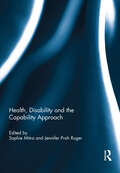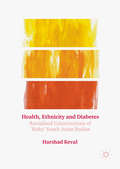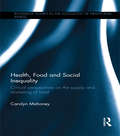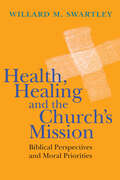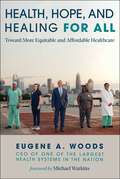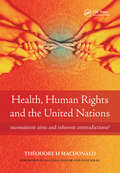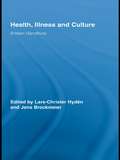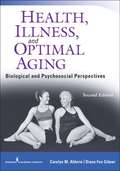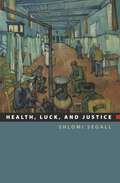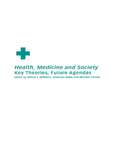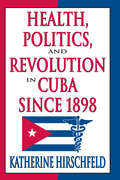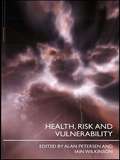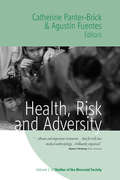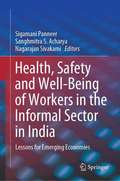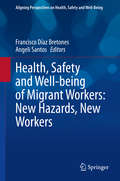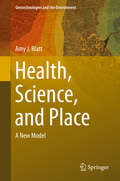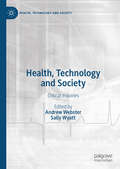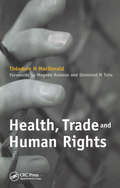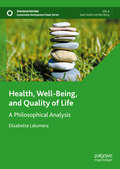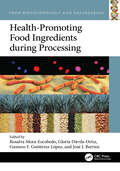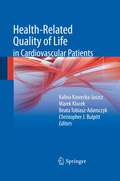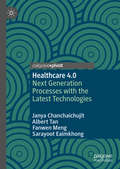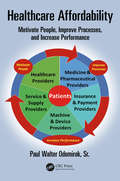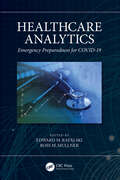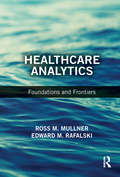- Table View
- List View
Health, Disability and the Capability Approach
by Sophie Mitra and Jennifer Prah RugerThis book focuses on two areas of substantial and growing importance to the human development and capability approach: health and disability. The research on disability, health and the capability approach has been diverse in the topics it covers, and the conceptual frameworks and methodologies it uses, beginning over a decade and a half ago in health and more than a decade ago in disability. This book shares a set of contributions in these two areas: the first set of chapters focusing on disability; and the second set focusing on health and the health capability paradigm (HCP), in particular. This book was originally published as a special issue of the Journal of Human Development and Capabilities.
Health, Ethnicity and Diabetes
by Harshad KevalThis book explores the often contentious relationship between health, concepts of race and ethnicity, and the impact on South Asian groups. Using medical sociological and anthropological perspectives, it excavates racialised constructions of diabetes 'risk' within discourses, and highlights the contrasting counter narratives in people's accounts of their everyday lives. By identifying a number of components to the discursive, racialised construction of 'risky' South Asian bodies, this book problematises taken for granted understandings of culture, lifestyle and genetic risk. The mobilisation of these mechanisms in health science and interventions result in a racialising gaze, directed at groups already experiencing historically embedded race-related issues. The book situates these constructions of risk against the emergent, fluid and dynamic counter narratives to risk constructions. The new found momentum in genetic science is also critiqued in its formulation of racial-genetic risk, especially in the case of diabetes in South Asian groups, and is identified as perpetuating a series of racializing processes.
Health, Food and Social Inequality: Critical Perspectives on the Supply and Marketing of Food
by Carolyn MahoneyHealth, Food and Social Inequality investigates how vast amounts of consumer data are used by the food industry to enable the social ranking of products, food outlets and consumers themselves, and how this influences food consumption patterns. This book supplies a fresh social scientific perspective on the health consequences of poor diet. Shifting the focus from individual behaviour to the food supply and the way it is developed and marketed, it discusses what is known about the shaping of food behaviours by both social theory and psychology. Exploring how knowledge of social identities and health beliefs and behaviours are used by the food industry, Health, Food and Social Inequality outlines, for example, how commercial marketing firms supply food companies with information on where to locate snack and fast foods whilst also advising governments on where to site health services for those consuming such foods disproportionately. Giving a sociological underpinning to Nudge theory while simultaneously critiquing it in the context of diet and health, this book explores how social class is an often overlooked factor mediating both individual dietary practice and food marketing strategies. This innovative volume provides a detailed critique of marketing and food industry practices and places class at the centre of diet and health. It is suitable for scholars in the social sciences, public health and marketing.
Health, Healing and the Church's Mission: Biblical Perspectives and Moral Priorities
by Willard M. SwartleyDoes the Christian community have the resources to develop a coherent response to health care challenges today? Accounting for biblical, theological and church-historical streams, Willard Swartley divulges a long tradition of healing and health care inherited by Christians today. Beginning with in-depth studies of Old and New Testament understandings of healing, the book surveys three millennia of biblical and theological teaching and practice in congregational life and mission. Along the way Swartley uncovers how Christians have understood the role of the church and other institutions in providing health and healing. The book concludes with an attempt to synthesize these biblical, historical and moral perspectives to help all Christians, including those in health care professions, respond to our current health care challenges.
Health, Hope, and Healing for All: Toward More Equitable and Affordable Healthcare
by Eugene A. WoodsOne of America&’s top healthcare leaders offers a prescription to fix an ailing and inequitable healthcare system In Health, Hope, and Healing for All, Eugene A. Woods, CEO of Advocate Health, one of the largest non-profit health systems in the nation, provides a riveting behind-the-scenes look at healthcare in the United States. By sharing his insights from three decades in healthcare administration, as well as his personal journey, readers gain a deeper understanding of the challenges facing healthcare systems and the impact on all of us. Woods sheds light on the inequities our communities face, especially in the context of the COVID-19 pandemic, and presents actionable prescriptions to create a more equitable, just and accessible healthcare system. He tackles tough questions around the affordability of healthcare, rising drug prices, alarming clinical shortages and more. As a Black healthcare CEO, Woods shares his personal experiences with injustice and charts a path towards meaningful change. His optimistic outlook and passion for transformation and innovation inspire readers to believe in the power of unity and resilience in the face of adversity.Health, Hope, and Healing for All is a must-read for those working in healthcare, policymakers, and individuals seeking hope and answers in an uncertain healthcare landscape. Supported by Woods' expertise and credibility, the book presents real solutions to the current crisis and highlights the urgent need to ensure accessible, affordable and compassionate healthcare for every American.
Health, Human Rights and the United Nations: Inconsistent Aims and Inherent Contradictions?
by Theodore Macdonald Diane Plamping'In the light of impending environmental catastrophe, people all over the world, in all walks of life, are becoming more aware of the pressing need to act globally. The need to base our decisions and actions less on parochial national advantage, sequestered in hate and suspicion of other nation's playing the same game of Russian roulette, have to give way to a new appreciation of the fact that our global village is indeed so very small and perilously frail. We depend upon one another as never before and, unless we insure the health and human rights of all, we shall surely each perish individually...' In "Health, Human Rights and the United Nations", Theodore H MacDonald carefully analyses the origin, development and structure of the United Nations (UN) and its key agencies, and considers its capacity to mediate the Universal Declaration of Human Rights. He takes a detailed look into human rights abuses in Sudan's Darfur province, Burma, Liberia, the Occupied Palestinian Territories and the United Kingdom. By investigating the development of the World Health Organization (WHO) and the pressures being brought to bear upon it, MacDonald exposes contradictions in the aims of both the WHO and the UN. Does the current global political scene and its neoliberal policies nullify the work of both? Is the UN fit for purpose? Can drastic reforms result in equitable solutions? Can a new trans-national body be developed, to arbitrate global trade, health, human rights and fiscal issues? This remarkable book is ideal for anyone interested in international law, human rights, global health, public health and health promotion. Public health and health promotion professionals, including international healthcare organisations, care agencies, and international charities will find the analysis enlightening. It is also of great interest to policy makers and shapers in communities and government, political activists and all those with an interest in equality and globalisation.
Health, Illness and Culture: Broken Narratives (Routledge Studies in Health and Social Welfare)
by Lars-Christer Hydén Jens BrockmeierThis collection of essays examines the interrelations between illness, disability, health, society, and culture. The contributors examine how "narratives" have emerged and been utilized within these areas to help those who have experienced d injury, disability, dementia, pain, grief, or psychological trauma to express their stories. Encompassing clinical case studies, ethnographic field studies and autobiographical case studies, Health, Illness and Culture offers a broad overview and critical analysis of the present state of "illness narratives" within the fields of health and social welfare.
Health, Illness, and Optimal Aging
by Carolyn M. Aldwin Diane Fox GilmerThis upper-level undergraduate and graduate text integrates current findings in biology, psychology, and the social sciences to provide comprehensive, multidisciplinary coverage of the aging process. This new edition incorporates the tremendous amount of research that has come to light since the first edition was published. From a physical perspective, the text examines age-related changes and disease-related processes, the demography of the aging population, aging theories, and how to promote optimal aging. Coverage of the psychosocial aspects of aging encompasses mental health, stress and coping, spirituality, and caregiving in later years. The authors address demographic, theoretical, and methodological issues on aging, including a worldwide overview of aging demographics. The book reviews biological and psychosocial theories and offers much-needed information on longitudinal design and statistics as they relate to aging research. It discusses the aging of the major organ systems, the brain and sensory systems, and the endocrine and immune systems; basic anatomy and physiology; normal, impaired, and optimal aging; and functional health. Psychosocial factors that affect health are addressed, including the interplay between physical health and mental health, stress, coping, and social support. The text also covers current issues in social gerontology, including such promising new trends as gerontechnology and Green Houses, and provides information on health promotion programs. New to the Second Edition: Information involving retirement, volunteer opportunities, housing, and adaptation to health changes Coverage of economics and aging, including information on social security and other retirement income and the future of Medicare and Medicaid Significant new information about the regulatory systems.
Health, Luck, and Justice
by Shlomi Segall"Luck egalitarianism"--the idea that justice requires correcting disadvantages resulting from brute luck--has gained ground in recent years and is now the main rival to John Rawls's theory of distributive justice. Health, Luck, and Justice is the first attempt to systematically apply luck egalitarianism to the just distribution of health and health care. Challenging Rawlsian approaches to health policy, Shlomi Segall develops an account of just health that is sensitive to considerations of luck and personal responsibility, arguing that people's health and the health care they receive are just only when society works to neutralize the effects of bad luck. Combining philosophical analysis with a discussion of real-life public health issues, Health, Luck, and Justice addresses key questions: What is owed to patients who are in some way responsible for their own medical conditions? Could inequalities in health and life expectancy be just even when they are solely determined by the "natural lottery" of genes and other such factors? And is it just to allow political borders to affect the quality of health care and the distribution of health? Is it right, on the one hand, to break up national health care systems in multicultural societies? And, on the other hand, should our obligation to curb disparities in health extend beyond the nation-state? By focusing on the ways health is affected by the moral arbitrariness of luck, Health, Luck, and Justice provides an important new perspective on the ethics of national and international health policy.
Health, Medicine and Society: Key Theories, Future Agendas
by Simon J. Williams Jonathan Gabe Michael CalnanTaking as its point of departure recent developments in health and social theory Health, Medicine and Society brings together a range of eminent, international scholars to reflect upon key issues at the turn of the century. Contributors draw upon a range of contemporary theories, both modernist and postmodernist, to look at the following themes: *health and social structure*the contested nature of the body*the salience of consumption and risk*the challenge of emotions Health, Medicine and Society provides a 'state-of-the-art' assessment of health related issues at the millennium and a cogent set of arguments for the centrality of health to contemporary social theory. Written in a clear, accessible style it will be ideal reading for students and researchers in health studies, public health, medical sociology, medicine and nursing.
Health, Politics, and Revolution in Cuba Since 1898
by Katherine HirschfeldChallenging many of the assumptions scholars have made about the Cuban Revolution's impact on healthcare, this volume recounts one anthropologist's quest to discover the truth behind the complicated relationship between Cuba's revolution, politics, and healthcare system. Katherine Hirschfeld became interested in Cuba in the mid-1990s, after reading numerous laudatory books and articles describing the Castro regime's achievements in health and medicine. Cuba's population health indicators seemed to be far superior to those of neighboring countries, the national health costs low, and medical care free at point-of-service to the entire people. Historical records indicated that most of these positive health trends resulted from the changes instituted by Castro in 1959. Few of these authors, however, had actually spent time on the island. Thus, Hirschfeld found that academic writing on Cuba was often long on praise, but short on empirical research about what exactly had changed in Cuban medicine since 1959.After much bureaucratic wrangling, Hirschfeld managed to secure permission to conduct long-term ethnographic research in Cuba, where she lived with families from Havana and Santiago, conducted clinic observations, interviewed doctors and patients, and was treated in a Cuban hospital during an epidemic of dengue fever. The reality of the Cuban healthcare system turned out to be different than the scholarly ideal: it was bureaucratized, authoritarian, and repressive, and most people preferred to seek healthcare in the informal economy rather than endure the material shortages, red tape, and political surveillance of the public sector. Written in the form of a first-person narrative, Health, Politics, and Revolution in Cuba Since 1898 not only critically reevaluates Cuban healthcare after the 1959 revolution; it includes chapters detailing Cuban health trends from the Spanish-American War (1898) through the fall of Fulgencio Batista in 1959 and into the
Health, Risk and Vulnerability
by Alan Petersen Iain WilkinsonThe concept of risk is one of the most suggestive terms for evoking the cultural character of our times and for defining the purpose of social research. Risk attitudes and behaviours are understood to comprise the dominant experience of culture, politics and society in our times. Health, Risk and Vulnerability investigates the personal and political dimensions of health risk that structure everyday thought and action. In this innovative book, international contributors reflect upon the meaning and significance of risk across a broad range of social and institutional contexts, exploring current issues such as: the ‘escalation of the medicalization of life’, involving the pathologization of normality and blurring of the divide between clinical and preventive medicine the tendency for mental health service users to be regarded as representing a risk to others rather than being ‘at risk’ and vulnerable themselves the development of health care systems to identify risk and prevent harm women’s reactions to ‘high risk’ screening results during pregnancy and how they communicate with other women about risk men and the use the internet to reconstruct their social and sexual identities Charting new terrain in the sociology of health and risk, and focusing on the connections between them, Health, Risk and Vulnerability offers new perspectives on an important field of contemporary debate and provides an invaluable resource for students, teachers, researchers, and policy makers.
Health, Risk, And Adversity (Studies of the Biosocial Society #2)
by Catherine Panter-Brick Agustin FuentesResearch on health involves evaluating the disparities that are systematically associated with the experience of risk, including genetic and physiological variation, environmental exposure to poor nutrition and disease, and social marginalization. This volume provides a unique perspective - a comparative approach to the analysis of health disparities and human adaptability - and specifically focuses on the pathways that lead to unequal health outcomes. From an explicitly anthropological perspective situated in the practice and theory of biosocial studies, this book combines theoretical rigor with more applied and practice-oriented approaches and critically examines infectious and chronic diseases, reproduction, and nutrition.
Health, Safety and Well-Being of Workers in the Informal Sector in India: Lessons for Emerging Economies
by Sanghmitra S. Acharya Sigamani Panneer Nagarajan SivakamiThis book focuses on the core problems of occupational health, safety and well-being of workers in the informal sector in developing countries, where it accounts for most of the rural labour force and a substantial percentage of the urban labour force. The sector is characterised by low incomes, unstable employment and lack of protection in the form of legislation/policies or trade unions. Though some health and problem-solving measures have been introduced, a focused academic effort to address the problems confronting workers in the unorganised sector, or informal economy, is lacking.The book evaluates workers’ physical and mental health in the context of labour migration, social inclusion of minorities and the differently abled, provisions for women workers, demonetisation, occupational safety for hazardous work, and in connection with various areas of informal work, e.g. agriculture, construction, transportation, sanitation, tanning, the tobacco industry, powerloom industry, surrogacy, and self-employment. It provides a well-rounded description of an analytical reflection on the challenges these workers face and focuses on social policy changes to help alleviate them. Accordingly, it offers a valuable asset for researchers and students interested in development studies, the sociology of work, health and labour economics, public health, and social work.
Health, Safety and Well-being of Migrant Workers: New Hazards, New Workers (Aligning Perspectives on Health, Safety and Well-Being)
by Francisco Díaz Bretones Angeli SantosThis volume explores psychosocial problems amongst one of the most vulnerable social groups in our societies, immigrant workers, through a multidisciplinary approach. Migration has sometimes been oversimplified as a flow of workers from “poorer”, developing nations to “wealthier”, industrialised nations. The issue, however, is more complex and currently migration is a global phenomenon in which all countries are recipients of workers from third countries and send workers to third countries. The working conditions of immigrant workers at various levels are not always well known, though some studies have established that the negative impact on migrant workers is cumulative, and primarily stems from adverse living and working conditions in a new country and increased levels of vulnerability. The contributions to this volume cover discussions on migrant workers in the industrial, agricultural and service sectors across the world. They critically study the impact of work Hazards on the health and wellbeing of migrant workers in order to shed light on the social and health implications of migrant work, explore the relation between organizational, psychosocial and work factors, and analyse the migration process from a wider perspective and as a global phenomenon present in every country. The contributors provide multidisciplinary and multicultural contemporary perspectives, thereby providing readers with wide-ranging insights. This volume is of interest to researchers and students from the social and behavioural sciences, particularly those focusing on health studies and migration studies.
Health, Science, and Place
by Amy J. BlattThe main focus of this monograph is synthesizing the importance of geographic approaches to public health and patient care. The chapters are organized into four themed sections: the role of geography in health care reform; the geographies of human health; geospatial data and technologies; and geography in medicine. It is a highly informative book, providing scientific insight for geographers with an interest in advanced geospatial applications and health research. The author is an international expert in geography, GIS, and public health, who recently co-edited a special issue on "Geospatial Applications in Disease Surveillance," published in the International Journal of Applied Geospatial Research.
Health, Technology and Society: Critical Inquiries (Health, Technology and Society)
by Sally Wyatt Andrew WebsterThis book celebrates and captures examples of the excellent scholarship that Palgrave’s Health, Technology, and Society Series has published since 2006, and reflects on how the field has developed over this time. As a collection of readings drawn from twenty-two books, it is organized around five themes: Innovation, Responsibility, Locus of Care, Knowledge Production, and Regulation and Governance. Structured in this way, the book gives the reader a concise but nonetheless rich guide to the core issues and debates within the field. Complementing these narratives, the original authors have provided new reflection pieces on their texts and on their current work. This then is a book which in part looks back but also looks forward to emerging issues at the intersection of health, technology, and society. It uniquely encompasses and presents a range of expertise in a novel way that is both timely and accessible for students and others new to the field.
Health, Trade and Human Rights: Using Film and Other Visual Media in Graduate and Medical Education, v. 2
by Archbishop Desmond Tutu Theodore H. MacDonald Grace H. ChickadonzThis work contains forewords by Desmond M. Tutu, Archbishop Emeritus, Cape Town, South Africa and Mogobe Ramose, Chairperson and Professor of Philosophy, Department of Philosophy, University of South Africa. "Health, Trade and Human Rights" shows how a policy of 'free' rather than 'fair' trade increasingly undermines Third World health. It clearly illustrates how the looming environmental crisis combined with growing levels of health inequity will have adverse effects and details precisely how the 'basic human rights' enshrined in the UN Charter have gradually become subsidiary to the dictates of free trade, enforced by the World Trade Organisation. This groundbreaking new book argues the need for impartial, data-based, and transnational arbitration of equity in health and other human rights - and suggests how this might be accomplished without violence to national rights, with an emphasis on 'regional free trade'. "Health, Trade and Human Rights" provides vital, thought provoking information for general readers with an interest in the Third World and social welfare. Academics and students studying development, international studies and public health will find it invaluable, as will healthcare professionals, international healthcare organisations, care agencies, and international charities. Policy makers and shapers in communities and government will find the content revelatory as will political activists and those with an interest in equality and globalisation. '[The book] criticises the basis, the method and the extent to which the politics of wealth continues to undermine and violate the right of the poor to good health. The combination of experience with scientific rigour is presented in accessible everyday language. It is seductive; inviting the curiosity of the reader to last until the very end of the book. MacDonald's message is clear and unambiguous: war is no longer the father of all things. Instead, justice is the mother of all peace.' - Mogobe Ramose, in his Foreword. 'Astonishingly accessible, informing and inspiring. Statistically sound, penetratingly. accurate, admirably balanced. Theodore MacDonald writes with passion, as well as with sense. Much of what he has to say is drawn from his own experience working as a medical doctor and a mathematician in a broad range of the world's poorest nations. But overarching that is a powerful insight into social and economic issues, along with well-honed skills as a communicator. I am pleased to recommend this splendid book.' - Desmond M. Tutu, in his Foreword.
Health, Well-Being, and Quality of Life: A Philosophical Analysis (Sustainable Development Goals Series)
by Elisabetta LalumeraThis book analyses and discusses from a philosophical perspective the concepts of health, well-being and quality of life in contemporary biomedical research. The guiding idea of the book is that different concepts of health, well-being, and quality of life lead to different types of projects, actions and policies, both at the individual and institutional level. For this reason, it is important to analyse them and make them clear, in their interweaving of objective dimensions (the facts) and evaluative dimensions (the values).
Health-Promoting Food Ingredients during Processing (Food Biotechnology and Engineering)
by Rosalva Mora-Escobedo Gloria Dávila-Ortiz José J. BerriosHealth-Promoting Food Ingredients during Processing presents a comprehensive science-based approach covering the latest naturally occurring bioactive compounds in seeds, dietary fiber, proteins, fermented bio-compounds, agro-industrial waste by-products, and lactic acid bacteria. A volume in the Food Biotechnology and Engineering Series, the book discusses their identification, characterization, biological activities in terms of their bioavailability, bioaccessibility, and their beneficial effects as inflammatory mediators, probiotics, antioxidants, and hypoglycemic agents, as well as in gastrointestinal digestion and colonic fermentation. Written by an international expert team of food scientists, nutritionists, food biotechnologists, food engineers, and chemists, the book explains how this leads to opportunities in the treatment of diseases such as obesity, diabetes, cancer, and cognitive disorders.Key features include:· Presents original research and relevant peer-reviewed articles written by experts in disciplines such as food science, nutrition, food biotechnology, food engineering, and chemistry.· Highlights new emerging trends, discoveries, and applications of biologically active compounds from seeds, dietary fiber, proteins, and agro-industrial waste by-products.· Provides readers with a comprehensive, science-based approach to the identification, characterization, and utilization of food macromolecules, probiotics, lactic acid bacteria, and bioactive compounds. - Discusses the impact of bioactive compounds in plants, agroindustrial by-products, and fermented biocompounds regarding their bioavailability, bioaccessibility, and potential human health benefits.
Health-related quality of life in cardiovascular patients
by Beata Tobiasz-Adamczyk Kalina Kawecka-Jaszcz Marek Klocek Christopher J. BulpittA modern definition of health goes beyond the biological dimension to encompass human functionality and well-being. Quality of life is one of the most popular health-related concepts and simultaneously reflects several dimensions of individual health. Health-related quality of life (HRQoL) is taken to include physical, psychological, and social aspects of positive well-being as well as negative effects of illness, treatment, and infirmity. Quality of life outcomes are now considered an important indicator of the success of both diagnostic and therapeutic procedures. In this book, recognized experts discuss the findings of various studies, including their own, regarding HRQoL in patients with cardiovascular diseases. The impact of the newest forms of medical treatment on well-being is considered in patients with arterial hypertension, coronary artery disease, heart failure, arrhythmias, and stroke as well as in patients who have undergone interventional procedures or have implantable cardiac devices. By summarizing established facts and presenting new data, this book will be an invaluable source of information for all practitioners in the field.
Healthcare 4.0: Next Generation Processes with the Latest Technologies
by Janya Chanchaichujit Albert Tan Fanwen Meng Sarayoot EaimkhongThis book aims to demonstrate the benefits of implementing Industry 4.0 in healthcare services and to recommend a framework to support this implementation. Key topics in this book include: (1) Discovering emerging technologies and techniques to support Healthcare 4.0, this includes the Internet of Things (IOT) , Big data analytics, Blockchain, Artificial Intelligence (AI) , Optimisation and Predictive Analytics; (2) Illustrating some examples of such advanced implementation in Healthcare 4.0; (3) Recommending a development process to develop health technology start-ups and entrepreneurial activities; and (4) Discuss the transformation methodology used to redesign healthcare processes in order to overcome the challenges of implementing a Healthcare 4.0 project.
Healthcare Affordability: Motivate People, Improve Processes, and Increase Performance (Continuous Improvement Series)
by Paul Walter Odomirok, Sr.Healthcare Affordability: Motivate People, Improve Processes, and Increase Performance applies the Theory of Affordability across the Healthcare Enterprise. Affordability is realized when the Value delivered exceeds the Patient’s requirements, while the expense for the quality resources required to deliver that Value is at a Cost less than the revenue received from the competitive pricing applied to the care. The aim of healthcare affordability is to attain performance excellence in all areas across the entire Healthcare Enterprise. The Healthcare Enterprise involves 5 types of providers: Healthcare Providers, Medicine and Pharmaceutical Providers, Machine and Device Providers, Service and Supplier Providers, and Insurance and Payment Providers. Obviously, one key focal point of healthcare affordability is affordable healthcare, a condition that has been chased for decades, but has yet to be achieved. This book provides a useful framework and foundation for any organization to pursue and achieve Affordability. Although there are many methods used to accomplish performance improvement, this approach has been proven successful with many organizations. It integrates strategic vision and direction, with operational goals and objectives and tactical targets and tasks. This book also provides a leadership strategy and structure for change and transformation, and a designed plan to execute an 18-month implementation program. Features: Affords patients and providers a better, faster, safer, and more affordable and profitable experience and approach Offers solutions for current state dilemmas, and provides a framework for future state success Increases the speed of delivery, improves the quality, and decreases the cost of care Provides methods and tools for linking and integrating strategic, operational and tactical goals Healthcare Affordability: Motivate People, Improve Processes, and Increase Performance provides readers with methods and means for solving the complex problem of affordable healthcare.
Healthcare Analytics: Emergency Preparedness for COVID-19
by Ross M. Mullner Edward M. RafalskiThe first COVID-19 case in the US was reported on January 20, 2020. As the first cases were being reported in the US, Washington State became a reliable source not just for hospital bed demand based on incidence and community spread but also for modeling the impact of skilled nursing facilities and assisted living facilities on hospital bed demand. Various hospital bed demand modeling efforts began in earnest across the United States in university settings, private consulting and health systems. Nationally, the University of Washington Institute of Health Metrics and Evaluation seemed to gain a footing and was adopted as a source for many states for its ability to predict the epidemiological curve by state, including the peak. This book therefore addresses a compelling need for documenting what has been learned by the academic and professional healthcare communities in healthcare analytics and disaster preparedness to this point in the pandemic. What is clear, at least from the US perspective, is that the healthcare system was unprepared and uncoordinated from an analytics perspective. Learning from this experience will only better prepare all healthcare systems and leaders for future crisis. Both prospectively, from a modeling perspective and retrospectively from a root cause analysis perspective, analytics provide clarity and help explain causation and data relationships. A more structured approach to teaching healthcare analytics to students, using the pandemic and the rich dataset that has been developed, provides a ready-made case study from which to learn and inform disaster planning and preparedness. The pandemic has strained the healthcare and public health systems. Researchers and practitioners must learn from this crisis to better prepare our processes for future pandemics, at minimum. Finally, government officials and policy makers can use this data to decide how best to assist the healthcare and public health systems in crisis.
Healthcare Analytics: Foundations and Frontiers
by Ross M. Mullner Edward M. RafalskiThis is a comprehensive, practical guide which looks at the advantages and limitations of new data analysis techniques being introduced across public health and administration services. The Affordable Care Act (ACT) and free market reforms in healthcare are generating a rapid change of pace. The "electronification" of medical records from paper to digital, which is required to meet the meaningful use standards set forth by the Act, is advancing what and how information can be analyzed. Coupled with the advent of more computing power and big data analytics and techniques, practitioners now more than ever need to stay on top of these trends. This book presents a comprehensive look at healthcare analytics from population data to geospatial analysis using current case studies and data analysis examples in health. This resource will appeal to undergraduate and graduate students in health administration and public health. It will benefit healthcare professionals and administrators in nursing and public health, as well as medical students who are interested in the future of data within healthcare.
